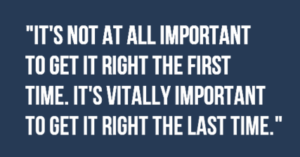Make Your Goals Attainable!
You have goals, of course. We all do. But are you seeing them making an appearance in the real world? I mean, are you actually getting any closer to their realisation? If not, maybe they’re not real goals at all. If you’re not treating them as real goals, then they’re no more than dreams really. Just things you’d vaguely like to have happen in your life. But not things you have definitely set your heart and mind on. There’s a difference.
A goal needs to be specific
 First off, have you set specific goals? It’s okay to want to be rich, or to have a business of your own, or to be financially independent, or whatever’s on your mind. Those are admirable aims. But they’re not goals. First and foremost, you have to be specific.
First off, have you set specific goals? It’s okay to want to be rich, or to have a business of your own, or to be financially independent, or whatever’s on your mind. Those are admirable aims. But they’re not goals. First and foremost, you have to be specific.
Let’s say you want to be debt-free. Okay, how deep are you in right now? Let’s say you owe £3,500. Then maybe your real goal would be better expressed like this: I will go from £3,500 in the red to being in the black. Now you have something specific to work towards!
Let’s say you want a business of your own. Sorry, but that’s way too vague! Maybe you work as an accountant. And maybe you can foresee having your own accountancy firm, and maybe that idea ticks all the boxes for you. Now you’re cookin’! That’s a real goal!
Let’s say you want an online business. Mmm … vague. How about you want to make a decent living selling products on ebay? Or selling products on Amazon? Still a bit vague (Which products? In which niche? Your own products, or as an agent? etc). But that’s a proper goal, to sell physical products online.
Does it have a time scale?
Personally, I’m not sure this always applies, but if you feel comfortable applying a time scale to your goal, it certainly adds to the precision of the whole thing.
“I want to have an online business” (very vague)
“I want to have an online business selling stationery items” (more specific)
“I want to have an online business selling stationery items on Amazon by the end of the year” (much more specific!)
“I want to be debt-free” (very vague)
“I want to go from £3,500 in debt to totally solvent” (more specific)
“I want to go from £3,500 in debt to totally solvent within six months” (much more specific!)
Being specific, and specially if you can add a time frame, can make your goals much more concrete and achievable. You will be more fired up to make things happen if you know exactly what you want to happen, and if you know how quickly you need to make them happen.
Having said that, I’ve found that adding a time frame can make a goal seem ‘heavier’, almost oppressively so, and that can work against you. It’s almost like you have a manager and he’s looking over your shoulder all the time and judging your work. No, doesn’t always work for me. I’ve had enough of bosses, I don’t feel the need for any more (even if they’re only imaginary).
Your goals need to be written down
 It’s a standard idea nowadays that you should write your goals down, but it’s easy to forget to do that. You can feel so strongly that this particular goal is a definite, set-in-stone thing, that it doesn’t need to be written down. And then life gets in the way, and you find yourself sidetracked by so many other things, and always busy, and not focused on your goals, and it’s all going to hell down a winding and slippery road, and gaining speed as it careers out of control.
It’s a standard idea nowadays that you should write your goals down, but it’s easy to forget to do that. You can feel so strongly that this particular goal is a definite, set-in-stone thing, that it doesn’t need to be written down. And then life gets in the way, and you find yourself sidetracked by so many other things, and always busy, and not focused on your goals, and it’s all going to hell down a winding and slippery road, and gaining speed as it careers out of control.
No, much more effective if you stick to the golden rule; write it down! If you don’t write it down it’s not actually a goal (make that a mental rule for yourself … if it’s not written down, it’s just a wish, or a dream, or something vaguely desired, but nothing pressing, nothing definite)
Be very careful of the wording!
Don’t use the wrong word, or you could actually be harming your chances of achieving your goals.
If you write: “I want to go from £3,500 in debt to totally solvent within six months” you’d think you’d done a good job of the writing down part of goal creating. Mmm … not necessarily. Your subconscious mind is very literal. It’s extremely powerful, but as literal as a half-wit. You tell it something, it believes it!
You tell it you want to go from £3,500 in debt, etc, and your subconscious mind hears that you want to go from … etc. Well we both know that you want to, and that you really mean you desire to … but your subconscious accepts it as gospel that you want this thing (and it might well take it in the sense of wanting, as in “that boy is in want of some guidance in his life”).
And it will go out of its way to do your bidding, i.e. give you more of what you want. And what it hears is that you want to get debt-free. Really, you shouldn’t be surprised if you stay in debt with that goal in mind. Your subconscious is probably doing all it can to keep you in debt, since you stated that you want to become debt-free.
 I know this is just a matter of semantics and detail, but the fact is this – if you want something, you are stating, fairly clearly, that 1) you don’t actually have it, and 2) you are in a state of lack. You are leaving yourself literally wanting! You’re stating that this thing that you desire, you don’t have … and you actually lack it completely. That’s not a good message to send to your innermost mind. Or out to the Universe, for that matter.
I know this is just a matter of semantics and detail, but the fact is this – if you want something, you are stating, fairly clearly, that 1) you don’t actually have it, and 2) you are in a state of lack. You are leaving yourself literally wanting! You’re stating that this thing that you desire, you don’t have … and you actually lack it completely. That’s not a good message to send to your innermost mind. Or out to the Universe, for that matter.
Your subconscious gets from that that you are in a state of wanting, a state of lack, and you’re more or less priming it to give you more of what you’re asking for. So it will be working against you, doing what it can to keep you in a state of lack!
Change the wording! Try this angle instead:
“I am going from a state of indebtedness to a state of solvency, and I’m achieving it by [insert date]”
Now you’re telling your subconscious that your desire is to move to a state of solvency. You’re not mentioning lack, except to say you’re leaving it behind. That’s hard to misinterpret.
Try to state all your goals in the most positive way possible. Stay away from phrases like “I want …”.
Use the present tense
Rather than stating that you want (or would like, or intend for) something to happen, state that it is happening already. “I will quit smoking” is shoving your desire to be a non-smoker away into the future. “I will make a success of (fill in the blank)” is the same – you’re using your time frame carelessly. When you say “I will”, you’re saying, in effect, ” … later”, or ” … one of these days”.
When you say “I am making a success of this business”, for example, you’re stating unequivocally that you’re already on your way. “I am … “ is one of the most powerful phrases in the language. “I am a non-smoker”, “I am exercising every day, for at least ten minutes”, “I am getting richer, in all kinds of ways” … all these phrases are set firmly in the now. You’re saying that you’re doing this thing, not planning to do it … or intending to … or hoping to.
Once again, semantics. Details. But very important, even vital, details. If you’re going to say something, and specially if you’re going to repeat it day after day, do all you can to get it right. Be precise. Make sure you’re saying exactly what you mean to say.
Repetition
Once you’ve stated your specific goals that should really be enough. It’s kinda like putting in an order for something with a company – you wouldn’t keep ringing them or emailing them every day for weeks, that would drive them crazy! So it might well be enough to write your goals and leave it at that. You’ve stated your intention and if you’re confident that it will happen, that should be it.
However, there’s a bit of wiggle room here. I cling to the idea that the subconscious is impressed by repetition, and by commitment. I like the idea of writing your goals down, and then reading them every day. Read them and really imagine what they mean. Visualise the outcome you want. See yourself debt-free, or running your own business, or getting in great shape, or whatever.
And experience the feelings you’ll have when these goals are achieved. Feel the sense of satisfaction, the pride, the feelings of accomplishment. Breathe in the wonderful feeling of a job well done. Feed your mind with positive and specific feelings of achieving your goals, and try to get alignment by doing so.
Harness the power of the Universe
There is a higher power that affects us and what happens to us. Some call it God, some call it Source energy, or the Great Spirit. If you believe in this force I don’t think it matters what you call it. You can call it Father if you like, or Lord. You can call it The Force if that resonates with you. You can call it uncle Bob if you like. All that matters is that you try to align with it.
Source energy is working in our interests all the time, but it can only help us insofar as it understands our desires. What I mean is this: if you state that you want to be successful, or you are becoming more and more successful, but then you’re actually thinking “Who am I kidding? I’m a loser and I’ll probably fail at this like with everything else. It’s like I was born unlucky”, then Source is confused. It is doing all it can to make you successful, but then it hears that actually you’re a loser and expect failure, so it changes tack and does all it can to help you fail.
It’s not being stubborn or awkward, it’s just responding to your thoughts. That’s all it has to go on, your thoughts and vibrational frequency. If you’re stating positive things but thinking negatively, you really shouldn’t be surprised if nothing much happens.
That would be a bit like ordering a meal in a restaurant and, ten minutes later changing your order. Then ten minutes further on, changing it again. And then again. How do you think the chef would feel, trying to fulfil your order, when it keeps changing all the time? Would you really be shocked if he sent the waiter out with a message that you should really eat elsewhere since he can’t cope with your constantly changing demands?
To make sure this doesn’t happen in something far more important that ordering a meal, be consistent. If you desire something, and you’ve stated it clearly, and you’ve written it down, don’t go and spoil it all by losing faith. The minute you start to think negatively about your goals, that’s the minute they are diluted.
Stay positive, all the time
Be positive, you hear it everywhere. Stay positive! It’s a strong message. But a stronger one is this: Stay Positive ALL THE TIME. Don’t be a part-timer in this respect; don’t waver between positivity and negativity. Don’t fluctuate. Don’t be all fired up one minute, then miserable and expecting the worst the next.
Make it a habit to maintain a positive attitude all the time. I know it’s not always easy, and occasionally you’ll ‘fall off the wagon’. I know that. But if you work at it, and if your intention is to maintain a strong, positive attitude at all times, you’re halfway there already.
Get into the habit of pulling yourself up if you find yourself thinking in a negative way. Pretty soon you’ll find you’re almost unfailingly positive in your attitudes and your approach to life. And the benefits of this change are wide-ranging.
As your attitude changes, so your whole world changes!
You will have a happier, more relaxed attitude. You will expect things to work out in your favour. You will start to see the best in people, instead of noticing their faults all the time. And you will be unceasingly grateful for all the good things in life. Because you will be more aware of them!
And the more positive you are, and the more grateful you are, the quicker and more surely you will home in on your goals. You will find that your goals are suddenly attainable, and much more easily so, and you have to keep rejigging them to take account of the fact that you’re achieving so much, and so quickly.
